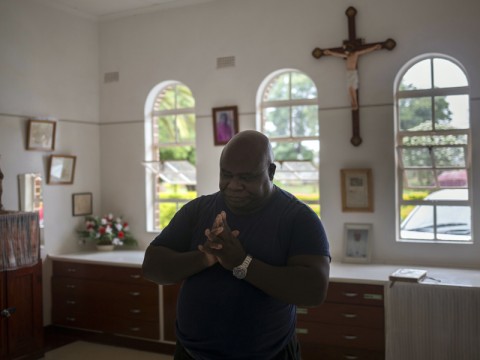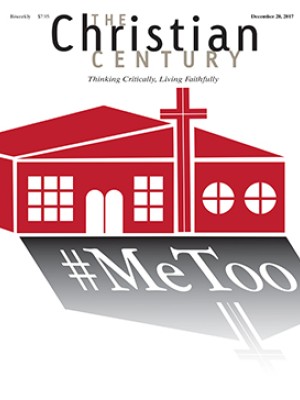Pastors play role in Zimbabwe’s change of power
A priest mediated. The council of churches called for national dialogue. And a Pentecostal pastor organized a large-scale protest.

Shortly after Zimbabwe’s generals put President Robert Mugabe under house arrest in November, a Jesuit priest—who has been close to the first family for all of Mugabe’s 37 years in office—began mediating.
Many hoped that Fidelis Mukonori, 70, who aided in the birth of Zimbabwe as its founding was negotiated in 1979 in London, would help bring into being a nation without Mugabe as its leader.
He knew it was “the end of the road,” the priest told the Associated Press. When Mugabe signed his resignation letter, he had an expression of relief, as though to say, “It’s done.”
Speaking five days later at the Chishawasha mission church east of Harare, the capital, Mukonori described the end of Mugabe’s presidency, which began with promise after the end of white minority rule in 1980 and unraveled under pressure from virtually all sectors of a society worn down by economic decline, government dysfunction, and restrictions on basic freedoms.
Events moved quickly after the military deployed troops in Harare on November 14. The 93-year-old leader resigned a week later, and Mnangagwa was inaugurated November 24 in a ceremony attended by tens of thousands of people yearning for change.
Read our latest issue or browse back issues.
After the military took power, the Zimbabwe Council of Churches began calling for a national dialogue among representatives from all sectors of society.
“There is no chasm that is too big not to be crossed through the power of reconciliation,” the council wrote in a statement. The nation is in a moment of “Kairos, an opportunity given to us by God to dream together that another Zimbabwe is possible!”
Evan Mawarire, a Pentecostal pastor in Harare who used social media to organize a national protest that shut down schools and businesses in July 2016, responded on Twitter to Mugabe’s resignation: “The journey has been long and hard, but we did it. I can’t stop crying. The future beckons.”
Mugabe, a Catholic in an overwhelmingly Protestant country, was born at a Catholic mission station and attended a Jesuit school in the British colony of Southern Rhodesia.
Mukonori, who first met Mugabe in 1974 at a Jesuit social service agency, counseled him as he went from revolutionary fighter to the nation’s first prime minister and then president after the country gained independence.
To Mugabe’s supporters, he has been a living icon, a man “who stood for the economic empowerment of the Zimbabwean people, [giving] land to the black majority who had lost it to colonialists,” said Fortune Mloyi of Mugabe’s Zimbabwe African National Union–Patriotic Front, who asked to be identified by a pseudonym because of the political uncertainty. “It is a legacy that many other African countries are still trying to follow.”
Mugabe’s rule began in 1980. In the following decade the nation reduced infant mortality and malnutrition while increasing literacy and life expectancy. Yet an army brigade was targeting the president’s political rivals, murdering as many as 20,000 people—many with little or no connection to the opposition party—in a campaign that became known as Gukurahundi, or “the rain that washes away the chaff.”
“He thought he was surrounded by enemies, especially among fellow liberation war fighters,” said Simba Makoni, former finance minister.
Zimbabwe slid into economic collapse in recent years, with hyperinflation reaching 79.6 billion percent in late 2008. Estimates place the number of Zimbabweans living abroad as high as three million from a population of 14 million.
Yet few in Zimbabwe expected the events of early November, when Mugabe fired his longtime ally and fellow liberation fighter Mnangagwa as vice president, positioning First Lady Grace Mugabe as the most likely new vice president and his successor.
“We knew that the military had sympathies” toward Mnangagwa, said Maggie Mzumara, a Harare-based political analyst, “and that they wouldn’t take too kindly to his ouster, however, the manner and speed with which this was all undertaken took us by surprise.”
General elections have been scheduled for 2018. It is not clear if Mnangagwa will usher in democratic reforms.
Mnangagwa invited Mugabe to the swearing-in, but he did not attend, according to Mukonori, the priest close to the president. Zimbabwean ruling party officials have assured Mugabe that he won't be prosecuted and that “his family is safe,” according to a senior party official, Lovemore Matuke.
Mukonori chuckled when asked whether Mugabe will stay in Zimbabwe. “Where would he go?” he said. “He would die here.”
Mavuso Tshabalala, who was three years old when Mugabe came to power and remembers no other president, is concerned about government after Mugabe.
“It is good news that he is finally leaving us, but my worry is on who is next,” he said. “People have suffered enough.”
A version of this article appears in the December 20 print edition under the title “Pastors play role in Zimbabwe's change of power.”





